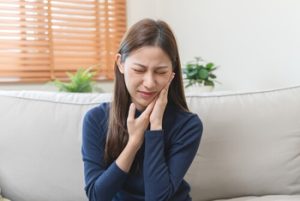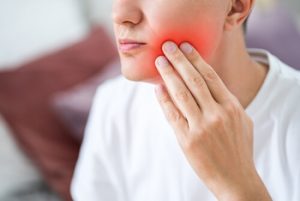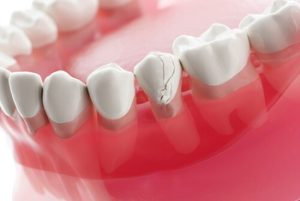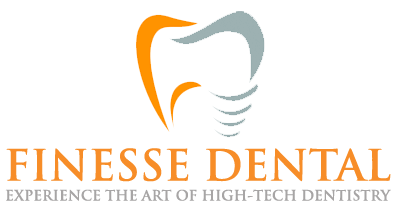Tooth pain when biting can be an unsettling and debilitating experience. The sharp, sudden discomfort might make you avoid your favourite foods or disrupt your daily routine. Understanding the hidden causes of this pain and seeking appropriate dental care is essential. This blog will delve into various reasons behind tooth pain when biting and offer insights into managing and preventing this condition.
Causes of Tooth Pain When Biting
Understanding the various causes of tooth pain when biting is crucial for effective treatment. From tooth decay to gum disease, several factors can contribute to this discomfort.
Tooth Decay
One of the primary reasons for tooth pain when biting is tooth decay. When a cavity forms, it can expose the sensitive dentin layer beneath the tooth enamel, leading to discomfort. As the decay increases, it can reach the tooth’s pulp, causing severe pain and increasing the risk of a dental abscess.
Cracked Tooth
A cracked tooth can also cause pain when biting. Although cracks may be microscopic and invisible to the naked eye, they can cause significant discomfort. The pressure from biting can cause the crack to open slightly, irritating the nerve inside the tooth.
Gum Disease
Gum disease, including periodontal disease and gingivitis, can lead to tooth pain when biting. Inflammation and decay of the gums can affect the supporting sections of the teeth, causing them to become loose and painful.
Teeth Grinding
Teeth grinding, or bruxism, can damage tooth enamel and lead to tooth pain. The constant pressure and friction can cause microfractures and sensitivity, particularly when biting down.
Sensitive Teeth
Tooth sensitivity is a major issue that can cause pain when biting. This condition often results from exposed dentin or receding gums exposing tooth roots. Sensitive teeth can react painfully to pressure, temperature changes, and certain foods.
Dental Abscess
A dental abscess is a severe infection at the tooth root or between the tooth site and the gum. It often results from untreated tooth decay or gum disease. An abscessed tooth can cause sharp pain when biting and other symptoms such as swelling and fever.
Loose Fillings
Over time, fillings can become loose, creating gaps that expose the tooth to bacteria and pressure. This exposure can cause sharp pain when biting down on the affected tooth.
Diagnosing Tooth Pain
Accurate diagnosis of tooth pain involves assessing pain symptoms and conducting thorough dental examinations, including X-rays, to identify underlying issues and determine the appropriate treatment.
Identifying Pain Symptoms

Dental Examination
A thorough dental examination is essential to identify the exact cause of tooth pain. This may include X-rays to detect hidden decay, fractures, or abscesses. The dentist will also check for symptoms of gum disease, loose fillings, and other potential problems.
Treatment Options
Addressing tooth pain when biting requires tailored treatment plans based on the specific cause, ranging from fillings and root canals to managing gum disease and addressing cracked teeth.
Professional Dental Care
Seeking professional dental care is essential when experiencing tooth pain when biting. Your dentist can recommend appropriate treatments based on the underlying cause. This might include fillings, root canals, or treatment for gum disease.
Managing Tooth Decay
For tooth decay, the dentist will eliminate the infected portion of the tooth and fill it with a suitable material. In severe situations, a root canal might be necessary to remove infected dental pulp and save the tooth.
Addressing Cracked Teeth
The treatment of a cracked tooth depends on its severity. Minor cracks might be treated with bonding or a crown, while severe cracks could require a root canal or extraction.
Treating Gum Disease
Gum disease treatment focuses on reducing infection and inflammation. This may involve deep cleaning procedures like scaling and root planing and medications to control bacterial infection.
Managing Sensitive Teeth
For sensitive teeth, the dentist might recommend desensitising treatments, toothpaste, or fluoride treatments to strengthen tooth enamel and reduce sensitivity.
Handling Dental Abscesses
Treating a dental abscess typically involves draining the abscess and eliminating the infection. This may require antibiotics, a root canal, or, in severe cases, tooth extraction.
Preventive Measures

Good Oral Hygiene
Maintaining a good oral regime is the cornerstone of preventing tooth pain and ensuring the overall health of your teeth and gums. Here’s how you can keep your mouth in top condition:
- Brushing: Brush your teeth routinely using a soft-bristled toothbrush and fluoride toothpaste. Ensure you cover all upper and lower teeth surfaces, including the chewing, outer and inner surfaces, and the gum line. Avoid aggressive tooth brushing, which can deteriorate tooth enamel and cause gum recession. Instead, use softer, circular motions to clean your teeth effectively without causing damage.
- Flossing: Floss regularly to eliminate plaque and food particles from between your teeth’ surface and beneath the gum line where your toothbrush can’t reach. This helps avoid tooth decay and gum disease, which can cause toothache.
- Mouthwash: Use an antiseptic mouthwash to eliminate bacteria that cause plaque and gum disease. Fluoride mouthwash can also help make the tooth enamel strong and reduce sensitivity.
Regular Dental Check-ups
Regular dental check-ups are needed to maintain dental health and prevent problems that could cause tooth pain when biting. During these visits, your dentist can:
- Professional Cleaning: To remove plaque and tartar material that you might have missed during regular brushing and flossing. This helps prevent gum disease and tooth infection.
- Early Detection: Identify and treat dental issues before they become serious problems. This includes detecting cavities, gum disease, or loose fillings that might lead to pain.
- X-rays: Take dental X-rays to detect issues that aren’t apparent to the naked eye, such as cavities between teeth, infections in the root surface, or bone loss.
Using a Mouthguard
If you grind your teeth at night (a condition known as bruxism), using a mouthguard can protect your teeth from deterioration and reduce the risk of experiencing pain when you bite. Mouthguards help cushion your teeth and prevent them from grinding against each other, which can wear down the enamel, cause cracks, and lead to tooth sensitivity.
Diet and Lifestyle
Your diet and lifestyle selection are significant in maintaining dental health. Here are some tips to keep your upper and lower teeth healthy:
Limit Sugary Foods and Drinks: Reducing your intake of sugary items can help prevent tooth infection.
Stay Hydrated: Drinking water helps wash away foodstuff and bacteria from your mouth. It also helps maintain saliva production, which is essential for neutralising acids and protecting teeth from decay.
Avoid Tobacco and Excessive Alcohol: Smoking and using other tobacco items can cause gum disease and oral cancer. In contrast, excessive alcohol consumption can elevate the danger of tooth decay and gum problems.
Protecting Tooth Enamel

Fluoride Treatments: To strengthen your tooth enamel, use fluoride toothpaste and consider professional fluoride treatments. Fluoride helps remineralise enamel and makes it more resistant to acid attacks from plaque bacteria.
Avoid Acidic Food Items: Limit your intake of acidic foods and drinks like citrus soda, fruits, and alcohol, which can erode enamel over time. If you consume these, wash your mouth with water afterwards to neutralise the acids.
Preventing Gum Disease
Healthy gums are crucial for maintaining the complete health of your teeth and preventing tooth hurt when biting. Here’s how to keep your gums healthy:
Proper Brushing Technique: As mentioned earlier, avoid aggressive tooth brushing and use gentle, circular motions. This helps prevent gum recession and protects the sensitive areas of your teeth.
Regular Flossing: Flossing helps eliminate plaque and food items from between your teeth and along the gum line, decreasing the risk of gum disease.
Professional Cleanings: Regular dental cleanings remove tartar and plaque buildup that can cause gum disease.
Conclusion
Experiencing tooth pain when biting can significantly impact your quality of life. Understanding the potential causes, from tooth decay and cracked teeth to gum disease and dental abscesses, is crucial for seeking appropriate treatment. Regular dental care and good oral regime practices are essential for maintaining healthy oral health and preventing pain when biting.
Don’t ignore the symptoms if you are experiencing pain when you bite. Contact Finesse Dental at (02) 8806 0790 to schedule an appointment and get the expert care you need to address your dental concerns. Your oral health is our priority, and we are here to help you achieve a pain-free, healthy smile.
Note: Any surgical or invasive procedure carries risks. Before proceeding, you should seek a second opinion from an appropriately qualified health practitioner.
References:
https://www.webmd.com/oral-health/toothache
https://www.healthline.com/health/dental-and-oral-health/home-remedies-for-toothache

